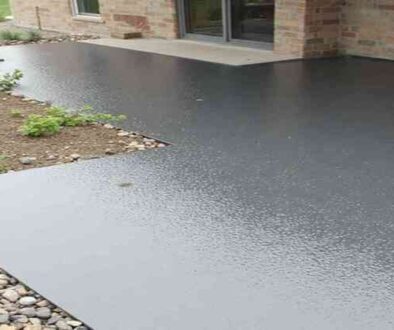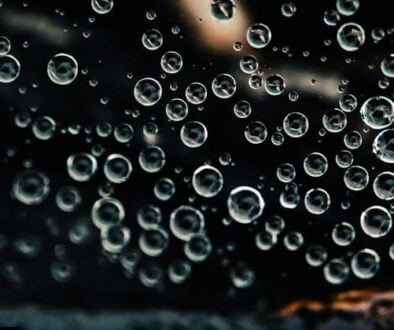The Best Sealers for Concrete Countertops: All You Need To Know
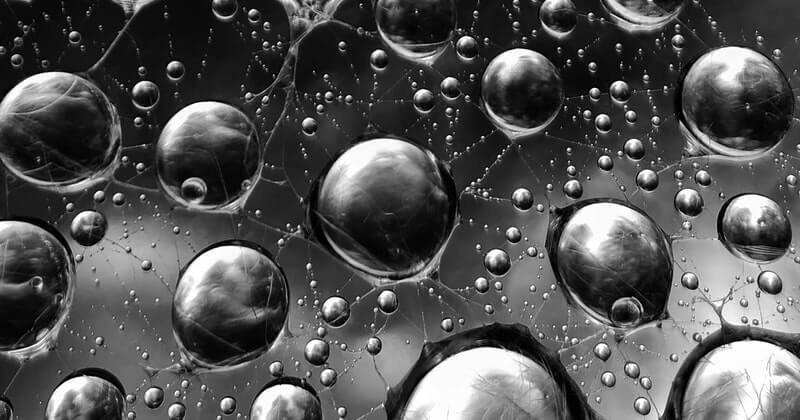
Last updated on March 23rd, 2022
Concrete countertops can be budget-friendly and can give a unique and classy touch indoors and outdoors. However, bare concrete countertops are prone to stains, scratches, deterioration, and chemical attacks. Thereby, it is essential to use an adequate sealer that can protect and even enhance the appearance of the surface.
In general, there are various types of sealers for concrete, and each has its advantages and disadvantages. In addition, there are plenty of brands and products in the market.
However, when it comes to sealers for concrete countertops, the requirements are often much different than those of floors.
You can read more about concrete sealers for such applications in “Which Concrete Sealers are Best for Patios, Driveways, Pool Decks, and Garages“.
Important evaluation factors to consider when choosing sealers for concrete countertops

Safety
One of the most important factors for choosing the best sealers for concrete countertops is safety. The sealer should be food safe since it can be contact with food. Hence, a food-safe sealer is essential to avoid the consumption of any toxins, fumes, or harmful chemical residues from the sealer itself.
Durability and performance
In addition, the best sealer for concrete countertops should have a good overall performance and an outstanding durability to the common harsh exposure conditions. Thereby, such sealers should be resistant to stains, etching, peeling, UV radiations, scratching, and high temperature exposure. Also, they should be somewhat budget-friendly, easy to clean and repair, and should provide a good overall protection on the long term.
Appearance
Besides, when it comes to appearance, the best sealers for concrete countertops should provide the desired appearance that meets the owner’s expectations. Some prefer a glossy non-natural finish, whereas others prefer a more natural finish with minor color enhancement.
The major exposure conditions of concrete countertops that affect the performance of sealers
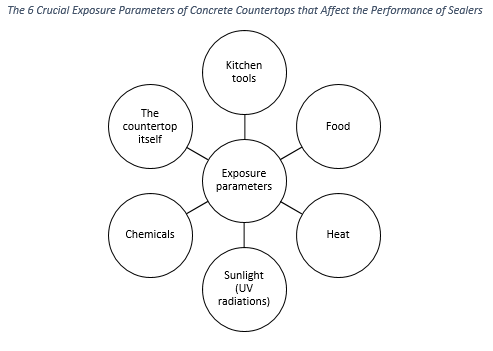
Kitchenware
 Kitchenware subject concrete countertops to harsh conditions, mainly scratching the sealer or even the surface of concrete. They are made of various materials such as cast iron, stainless steel, and glass, which are relatively hard. Such materials, especially in sharp tools, can easily scratch or leave wear and tear marks on concrete countertops.
Kitchenware subject concrete countertops to harsh conditions, mainly scratching the sealer or even the surface of concrete. They are made of various materials such as cast iron, stainless steel, and glass, which are relatively hard. Such materials, especially in sharp tools, can easily scratch or leave wear and tear marks on concrete countertops.
Food
Food, with its various compositions and pH, mainly exposes countertops to stains and etching. The following products are the main concern with common stains on concrete countertops.
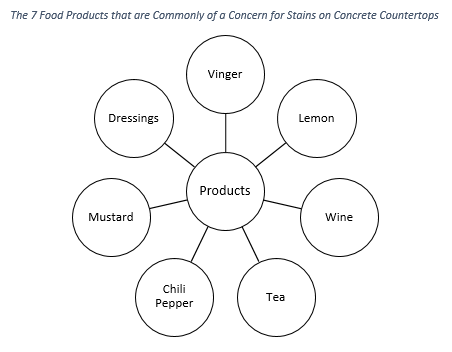
 For example, the acidity of vinegar, lemon, and dressings can easily cause stains or even etch marks on concrete countertops, especially when using inadequate sealers. Also, wine, especially red, can cause stains due to its color, acidity, and chemical composition. Also, the presence of alcohol can even soften the sealer depending on its type. In addition, tea, chili pepper, mustard, and some food dyes, can also cause stains and discoloration.
For example, the acidity of vinegar, lemon, and dressings can easily cause stains or even etch marks on concrete countertops, especially when using inadequate sealers. Also, wine, especially red, can cause stains due to its color, acidity, and chemical composition. Also, the presence of alcohol can even soften the sealer depending on its type. In addition, tea, chili pepper, mustard, and some food dyes, can also cause stains and discoloration.
Heat
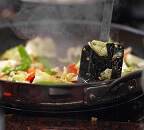 The exposure of sealers for concrete countertops to high temperatures is very common. The most common example is placing a hot pan directly on the concrete countertop without any protection in between. This practice can leave marks, soften the sealer, or even alter its chemical composition if the sealer is not heat resistant. Other examples include spilling hot oil or boiling water on the countertop.
The exposure of sealers for concrete countertops to high temperatures is very common. The most common example is placing a hot pan directly on the concrete countertop without any protection in between. This practice can leave marks, soften the sealer, or even alter its chemical composition if the sealer is not heat resistant. Other examples include spilling hot oil or boiling water on the countertop.
Sunlight (UV radiations)
 The exposure to direct sunlight, whether the countertop is interior or exterior, also affects the performance of sealers. The ultra-violet (UV) radiations can cause yellowing of the sealer if it is inadequate. For example, usually epoxy sealers can turn yellowish over time due to the exposure to UV radiations.
The exposure to direct sunlight, whether the countertop is interior or exterior, also affects the performance of sealers. The ultra-violet (UV) radiations can cause yellowing of the sealer if it is inadequate. For example, usually epoxy sealers can turn yellowish over time due to the exposure to UV radiations.
Chemicals
In addition, sealers for concrete countertops can also be exposed to harsh chemicals. These chemicals include cleaning agents that are often used to clean kitchen appliances, gas stoves, accessories, and dish washing machines for example. The main concern of such chemicals in contact with sealers can cause softening of the sealer, staining, etching, and deterioration over time.
The countertop itself
Furthermore, the countertop itself can affect the overall performance and durability of the sealer. For example, a poorly designed concrete countertop that suffers from excessive deflections and cracks subjects the sealer to undesired stresses. In addition, the concrete mix design of the countertop can also affect the performance of the sealer. For example, the porosity of concrete, the compatibility of materials, and plenty of other factors can affect the absorption and consumption rate of sealers.
Hence, when choosing the best sealers for concrete countertops, these factors should be taken into consideration. Thereby, the sealer should be resistant to scratches, stains, heat, UV radiations, and various chemicals. Also, reducing the exposure to such conditions can prolong the lifetime of the sealer and reduce its maintenance.
Types of sealers for concrete countertops
Sealers for concrete countertops, just like concrete sealers in general, can be classified into two main groups, penetrating and film-forming.
You can read more about the types of sealers for concrete in the following article, “The Major Types of Sealers for Concrete“.
Penetrating sealers
Penetrating sealers are chemicals which penetrate into the surface of concrete to provide protection. These sealers can be either repellants or surface hardeners/densifiers.
Repellants include silanes, silicoantes, siloxanes, and fluoropolymers, which increase the surface tension of concrete to repel water and provide protection. Whereas, surface hardeners/densifiers include silicates, which chemically react with concrete to fill voids and reduce the porosity of the surface.
Penetrating sealers for concrete countertops
Penetrating sealers are beneficial in providing some degree of protection to concrete countertops while reserving a natural look. One of their main advantages is that they do not form any film on the surface of concrete. Thus, they are not prone to scratches or peeling off. In addition, penetrating sealers are resistant to heat and to ultra-violet radiations, and often last long.
However, penetrating sealers have a main disadvantage on concrete countertops. They are not usually stain-proof, especially when it comes to the harsh exposure conditions on concrete countertops. Frequent and prolonged exposure to food products that are commonly of a concern for stains (such as vinegar, wine, dressings) would cause stains and etching. Thereby, it is usually recommended to clean any undesired spills as quick as possible.
Film-forming sealers
Film-forming sealers are chemicals that protect the concrete surface by encasing it with a film. This type of sealers mainly includes acrylic, polyurethane, and epoxy sealers.
Film-forming sealers for concrete countertops
- Acrylic sealers are easy to apply and can provide good protection to a concrete countertop. The main benefits of acrylics are that they are usually budget-friendly, resistant to UV radiations, available in various sheen levels, provide good protection against stains, and can be easy to repair depending on their type.
However, acrylic sealers only provide some degree of heat resistance, and can start to soften upon frequent and prolonged exposure to heat. Also, acrylics can be easily scratched, and are prone to peeling off. And in case of any scratches, the concrete surface would be in direct contact with food without any protection. Furthermore, acrylic like any film-forming sealer, gives an artificial look to a concrete countertop, but not as much as polyurethane or epoxy, since it is relatively thin. - Polyurethane sealers have many advantages and can provide a great overall performance on concrete countertops. They are resistant to scratches, heat, UV radiations, and stains. Also, they are usually available in various levels of sheens to give the desired finishing expectations.
However, polyurethanes do give a non-natural plastic finishing effect. Also, they are not easy to repair especially that most polyurethanes do not well-bond to themselves. - Epoxy sealers form a thick coating which provides a good protection against stains. However, epoxies have various disadvantages. They are mostly sensitive to UV radiations, and can start yellowing upon frequent exposure to sunlight. Also, since they form a thick layer, they give a non-natural plastic and glossy finish to the concrete countertop, which is mostly not desired. Also, epoxy sealers are usually not resistant to heat. In addition, although epoxy forms a relatively hard coating, it is easily prone to scratches when it comes to the exposure conditions on a concrete countertop.
So, which sealer or type of sealers for concrete countertops can cover all the requirements of outstanding safety, durability, performance, appearance, and resistance?
Of course, there are various products in the market that can provide a good overall performance. But to be rational, the answer is “none”. Till today, there is no single product which can ideally cover all the important factors without any flaws. Most products have their own advantages and disadvantages, but do compromise somewhere in order to provide a combination of good safety, durability, performance, and resistance.
To sum up, penetrating sealers reserve the natural look of concrete and provide a good overall performance, but are only stain-resistant to some extent. Whereas, film-forming sealers are generally stain-proof, but compromise in the appearance.
For this reason, most of the leading manufacturers of concrete countertops use either multiple coatings, relatively new special sealers, or a combination of coatings (the so called “system”).
- Multiple coatings: Some manufacturers use multiple applications of penetrating sealers in order to saturate the surface and provide a good protection. Then, they apply wax as a protective coat, which requires a periodic reapplication, like every month or two.
This process allows the concrete to stay breathable, reserve a natural look, and gain its natural aging appearance with time. - Relatively new special sealers: Others use relatively new products or hybrid sealers which can partially penetrate into the surface of concrete leaving a relatively thin topical layer on the surface. They generally apply these products in multiple coats over several days. Then, they apply wax similar to almost all concrete countertops.
This process provides a great protection and enriches the color of concrete. In fact, it allows the countertop to achieve a high degree of stain-resistance while not compromising much in its natural appearance. - Combination of coatings (system): Also, some other leading manufactures of concrete countertops use a combination of penetrating sealers, film-forming sealers, and wax. Generally, after surface preparation, they apply one or more coats of a penetrating sealer, depending on the absorption of concrete. Then, they apply a thin film-forming sealer that is compatible with the penetrating sealer and well-bonds to the surface. And finally, they apply a coat or two of wax.
This process usually provides an outstanding protection and resistance to various exposure conditions. Also, it enriches the colors of concrete without the addition of a thick plastic layer, but only a relatively thin protective layer. In addition, they use breathable products to have a somewhat breathable system, which helps concrete to gain its natural aging appearance over time.
Tips:
- Surface preparation is always the main key to a successful application of sealers for concrete countertops. Surface preparation helps in ensuring that the sealer has a good substrate to soak into or to bond to.
- Try to avoid tinted sealers for concrete countertops, since they can wear non-uniformly with time causing aesthetic flaws.
- Clean any spills of food products that are of a concern for stains as soon as possible in order to protect and prolong the lifetime of the sealer.
- Reapply wax coatings on time, since they are the first layer of protection.
- Always use food-safe sealers for concrete countertops. Sealers for concrete floors are not designed to be used on countertops, and their exposure conditions are way too different.
- Do not use harsh chemicals when cleaning your concrete countertop. This will reduce the lifetime of the sealer and increase its maintenance.


